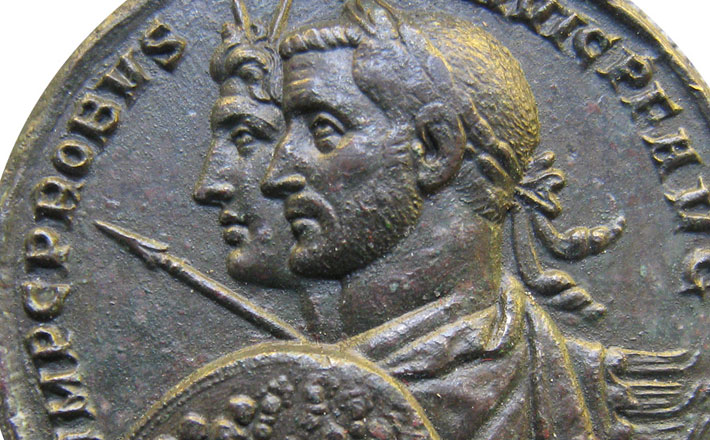Commentary on Matthew 22:15-22
Politically, just about the only thing Pharisees and Herodians have in common is that they don’t like Jesus.
So they hold their noses, put aside their many differences for a moment, and come together to pose Jesus a question that they hope will put him between a rock and a hard place: “Is it lawful to pay taxes to the emperor, or not?” (verse 17)
If he answers that the taxes are lawful, he will give offense to the Pharisees and the many in the crowds who hate the empire’s constant meddling — not to mention the poor who are especially burdened by this particular “flat tax.”1 On the other hand, if he speaks out against the tax, it won’t take long for the Herodians, who are loyalists to Rome, to take news of such seditious talk back to the powers that be. It is a well-laid trap, and all the more so because it is prefaced by a flattering reminder that Jesus has a reputation for fearless truth-telling, not political maneuvering (verse 16).
Jesus is not fooled by the flattery, but he does agree to answer the question. But first, he reframes the issue subtly by asking to see the coin used to pay the tax. This is a clever move because it allows all onlookers, including the reader, to see for themselves what Jesus already knows: Jesus is the one being put on the spot, but it is his questioners who are more deeply entangled with, and complicit in, the exploitative economics of empire. Jesus’ pockets are empty, but his opponents have no trouble supplying a denarius on demand.
When they produce the coin of the realm, Jesus puts off his answer another moment in order to make one more thing clear: “‘Whose head is this, and whose title?’ They answered, ‘The emperor’s.’ Then he said to them, ‘Give therefore to the emperor the things that are the emperor’s, and to God the things that are God’s’” (verses 20-21).
The consensus at the time seems to have been that Jesus managed to wiggle out of the trap (verse 22), but it’s not clear that anyone yet has figured out precisely what he was getting at. Some people point to this passage as proof that God and politics should be kept separate — that things like taxes have absolutely nothing to do with one’s theological commitments. Others say that this story proves that religion is a matter of the heart, and that Jesus doesn’t really care about mundane things like what you do with your money. And some have cited this passage as proof that Jesus taught that the law is the law, and our duty as Christians is to support the government no matter what. All three of these interpretations are dubious.
Like a lot of things Jesus said, these words are hard to pin down to just one meaning; they seem to blossom upon reflection into a surplus of significance. The more we think about this enigmatic saying, the more it shows us. The richness and subtlety of the answer is further enhanced when we remember that Matthew’s Jesus has already spoken on the subject of money and divided loyalties: “No one can serve two masters; for a slave will either hate the one and love the other, or be devoted to the one and despise the other. You cannot serve God and wealth” (6:24). Whatever Jesus is getting at here, he must not be describing a compromise that divides human loyalties neatly between YHWH and the emperor.
By highlighting the physical features of the denarius used to pay the tax, Jesus gives us a number of things to think about. In the first place, the image of the emperor stamped into the coin’s surface, along with the blasphemous inscription with its claim to divinity2, call to mind the prohibition against images in the Decalogue (Exodus 20:4). By pointing out that his opponents possess and display such an object within the Temple grounds (21:23), Jesus seems to raise, not lower, the stakes of the conversation about money and human loyalty. The issue at stake here is nothing less than idolatry. (And this is not a problem that we can solve simply by printing different words on our currency — even words that confess our trust in God.)
Furthermore, when we think about Jesus highlighting the physicality of that denarius — the coin stamped out by human hands for human purposes, and the image of Caesar imprinted on it — it’s hard to ignore the connection to those words from the beginning of Genesis about what God said the first time God stamped out a human being: “Let us make humankind in our image, according to our likeness” (Genesis 1:26).
Confronted with the question of human loyalty and the coin bearing the image of the earthly emperor, it’s easy to picture Jesus flipping that coin in his hand a few times, and then tossing it casually aside. In my imagination I see his eyes rising to meet those of his opponents, confronting each of them with an unspoken question hanging in the air: “And you, my friend: Whose image do you bear?”
One thing, at least, seems clear: Jesus is not solving the dilemma by carving out separate domains of human loyalty. For every character in the story, and for each of us who still bother to read and ponder it, one absolute commitment subsumes and relativizes all other commitments.
Whatever we render unto Caesar, or to the retirement fund, or to the offering basket at church, we can never afford to forget this: we belong entirely to God. We may divide our budget, but we must never divide our allegiance. The coin of our realm bears the image of dead presidents, but each of us bears another. Our Emperor said: “Let us make humankind in our image, according to our likeness.” We must never forget to render unto God the things that are God’s.
Notes:
1 The tax in question is the Roman “census,” instituted in 6 CE.
2 The inscription on the coin required for the tax reads: Augusti Filius August Pontifex Maximus (“Tiberius Caesar, august son of the divine Augustus, high priest”). Boring, Eugene, Matthew – Mark, The New Interpreter’s Bible: A Commentary in Twelve Volumes, volume 8 (Nashville: Abingdon Press, 1995), 420.


October 19, 2014